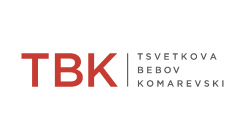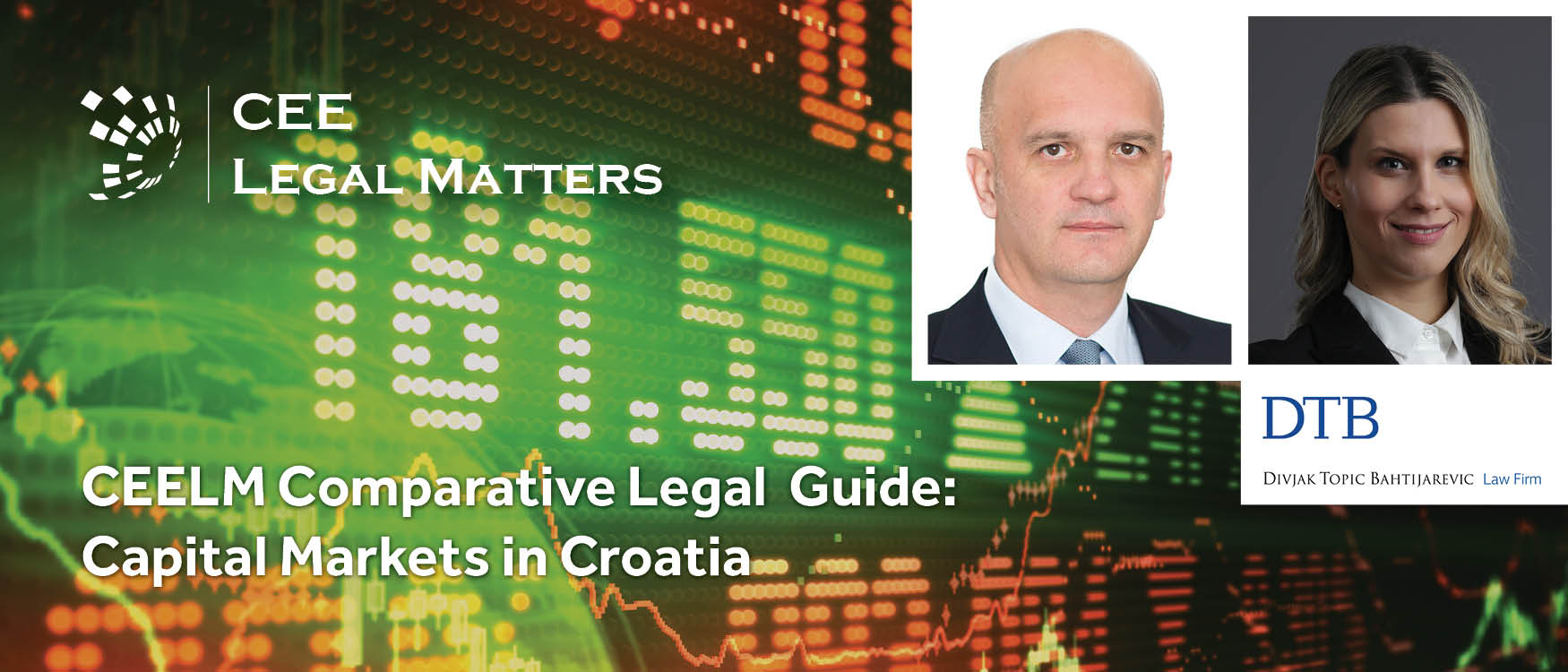Contributed by Tsvetkova Bebov Komarevski.
1. Market Overview
1.1. Biggest ECM and DCM transactions over the past 2-3 years
The past three years were somewhat flat in terms of major ECM and DCM transactions floating from Bulgaria. There have been notable exceptions, though.
In 2018, Bulgarian Energy Holding, a state-owned holding company which consolidates the participation of the state in the Bulgarian energy business, issued its third EUR 400 million Eurobond issue, which was subsequently tapped to EUR 600 million. The Eurobonds were double listed on Euronext Dublin and Bulgarian Stock Exchange (BSE). In addition, during the past three years a number of local bonds were placed on the domestic market, the biggest of EUR 15 million in size.
On the ECM side, 2018 has seen one relatively sizeable IPO in Bulgaria, the ca. EUR 25 million IPO of Gradus AD, a poultry farm. While no major IPOs have been placed in Bulgaria in 2019, good news came in early 2020: Eleven Capital AD, venture capital structure, chose to fund its business through the capital market and completed the first Bulgarian IPO since 2018 in March 2020. Even though the IPO was relatively small, it is an important step towards the Bulgarian capital market for the local start-up ecosystem, as Eleven Capital AD is the first venture capital structure in Bulgaria which decided to fund its business through the capital market. TBK assisted as the single legal counsel for this transaction.
Several other ECM transactions scheduled for 2020 have now been postponed due to the COVID–19 pandemic and the uncertainties on the domestic and international markets. Not officially postponed is the most notable of these transactions – a planned up to BGN 200 million (ca. EUR 102 million) capital increase of First Investment Bank AD.
2. Overview of the local stock exchange and listing segments (markets)
2.1. Regulated market
There are two regulated markets in Bulgaria, both operated by the Bulgarian Stock Exchange, the BSE Main Market and BaSE Alternative Market.
BSE Main Market is the main market and is divided in several segments. The prime share segment is called the Premium Segment and the other main segment is Standard Segment. There are also several other special segments, such as the Special Purpose Vehicles Segment, where the shares of REITs are traded, and a Bonds Segment.
Less liquid issues are traded on the BaSE Alternative Market. Their admission is made only ex officio by the Bulgarian Stock Exchange through relocation from the BSE Main Market if the issue or its issuer no longer comply with the requirements of the main market.
2.2. Non-regulated market for equities
Bulgarian Stock Exchange runs also a MiFID II SME Growth Market, called BEAM (Bulgarian Enterprise Accelerator Market). The efforts of BSE in the past year were mainly focused on the development of this multilateral trading facility (MTF) by attracting small and medium sized companies to list their shares on BEAM. This market is quite new which is why there are still no companies listed on BEAM. Some companies have already announced their plans for a listing on BEAM.
3. Key Listing Requirements on the BSE
3.1. ECM
The key listing requirement for equity securities listings on the regulated market segments of the BSE is the publication of a listing prospectus approved by the Bulgarian competent authority, the Financial Supervision Commission (FSC) (see item 4 below). In addition, the following applies:
For the Premium Segment the equity issuer must have been profitable at least for two out of the preceding five years, must comply with the corporate governance standards (including to be disclosing information in English), as well as must meet requirements for:
(i) financial history – at least 5-year of financial history;
(ii) free float – at least 25% free float or free float amounting to at least BGN 5 million (ca. EUR 2.5 million) in market cap;
(iii) total market cap – at least BGN 50 million (ca. EUR 25 million), alternatively the equities to have been previously listed on the Standard Segment for at least one year;
(iv) monthly average turnover – at least BGN 300,000 (ca. EUR 153,000) monthly average turnover in the equities listed on the BSE for the preceding six months; alternatively, the issuer must have an arrangement with a market maker; and
(v) number of transactions – at least a monthly average of 150 transactions in the listed equity securities within the preceding six months; alternatively, the issuer must have an arrangement with a market maker.
The requirements for listing on the Standard Segment of the BSE are less strict and include a monthly average turnover in the listed equity securities within the preceding six months of at least BGN 4,000 (ca. EUR 2,045) and at least a monthly average of 5 transactions in the equity securities within the last six months.
Listings on BEAM require the production of a listing memorandum (instead of a prospectus), the employment of an BSE approved advisor, and compliance with several other requirements.
3.2. DCM
For the listing on the Bonds Segment of BSE, the remaining maturity of the bonds must be at least one year and the total outstanding principal amount under the bonds must be at least (the equivalence of) BGN 1 million, denominated in BGN, EUR or USD.
4. Prospectus Disclosure
4.1. Regulatory regimes (Prospectus Regulation or similar) – equity and debt
The new Prospectus Regulation, i.e. Regulation (EU) 2017/1129, applies in full as of 21 July 2019. This Regulation, together with its supporting legislation (the “New EU Prospectus Legislation”), applies directly across the European Union, including Bulgaria, and in the EEA as a whole, both for equity and debt instruments. A draft bill amending Bulgaria’s Public Offering of Securities Act (POSA), which set out the local prospectus regime under the predecessor Prospectus Directive, was circulated for public discussion in February 2020 and is expected to be enacted in the near future. Until then, the “old national regime” prior to the new Prospectus Regulation, is temporary kept in order to achieve a smooth transition.
According to the New EU Prospectus Legislation, except where certain exemptions apply, a prospectus must be drafted, approved by the competent regulator, the FSC, and published, prior to the beginning of a public offer of securities in Bulgaria and/or the admission of securities to trading on a regulated market.
The prospectus can be drafted either as three separate documents (i.e., a registration document, a securities note, and a summary), or in one single document, which covers the required information from the three aforementioned documents. While the preferred option for issuers in Bulgaria in the last fifteen years has been the preparation of a three-component prospectus, local practices are evolving towards a more commonplace use of a single document prospectus.
The prospectus must contain, as part of the registration document, information about the issuer and its organizational structure and management, the risk factors to which the issuer’s activities are exposed, a business review of the issuer, as well as information on the issuer’s financial condition. In addition, the securities note section of the prospectus must contain information on the terms and conditions of the securities and their offer and the risk factors inherent to the offered securities. The summary must contain a brief resume of the information provided in the registration document and the securities note, and must make it possible for potential investors to understand easily the characteristics of the issuer and the offered securities.
Special rules apply to prospectuses in relation to securities issued by REITs. In addition to the minimum content of the prospectus, as provided in the New EU Prospectus Legislation, the prospectus for REITs must contain information regarding the investment policy, investment restrictions and the characteristics of assets which may be acquired by the respective REIT, as well as data about the custodian bank, the servicing companies and the evaluators of the REIT and applicable management fees and fees for servicing companies.
In relation to debt instruments issuances, where a publication of prospectus is not mandatory (e.g., private offerings), the Bulgarian Commercial Act provides for a minimum content of the offering circular, which must include the most important information about the offered bonds and the terms and conditions for subscription, such as information on the size of the offered bonds, face value and issue value of the bonds, their maturity and repayment schedule, the interest payment structure, the collateral (if any) under the bonds, the terms and conditions for subscription of bonds, et cetera.
The prospectus or offering circular for mortgage-backed bonds (the issuers of which may only be banks) must contain specific additional information to meet the requirements of the Mortgage-Backed Bonds Act of 2000. This includes: an outline of the rules on the cover pool register (ways of making entries into and access to the register), which the issuing bank must maintain for each issue of mortgage bonds; details of the mortgage assets included in the cover pool (including details of the mortgage loans such as remaining term to maturity, interest and fees features, risk qualification of the loans; and details of the mortgaged properties together with valuation); and detailed breakdowns of the cover pool assets in terms of outstanding principal amounts, term to maturity upon issue of the bonds, interest rate levels, risk qualification, ratio between outstanding principal amount on the mortgage loans and the mortgage property valuation. The Mortgage-Backed Bonds Act will be reshuffled in the context of the transposition of the Cover Bonds Directive in Bulgaria.
4.2. Local market practice
After the New EU Prospectus Legislation became applicable, the local market practice follows the new regime. Nonetheless, there are still certain local specifics, which need to be taken into consideration.
4.2.1. Liability for the information included in the prospectus
The POSA provides, as required under the new Prospectus Regulation, that the members of the management body of the issuer, its procurators, as well as the offeror, the person asking for admission to trading, and (where applicable) the guarantor, are jointly liable for any damages arising out of untrue, misleading or omitted information in the prospectus.
However, it is noteworthy that according to Bulgarian law, in excess of the Prospectus Regulation requirements, the officers responsible for the preparation of the financial statements of the issuer are also jointly liable with the foregoing for any damages arising out of untrue, misleading and omitted data in the financial statements of the issuer. The issuer’s auditors are liable for damages arising out of the audited financial statements of the issuer.
On the other hand, there are no special rules on the liability of experts, whose expertized opinions may be referenced in a prospectus.
In addition to civil liability and administrative sanctions that may be imposed by the FSC, the Penal Code provides that there is a criminal liability for any person who, in relation to public offer of securities, knowingly uses untrue favorable information in a prospectus, or does not disclose unfavorable data, which is of material importance in the making of an investment decision to acquire such securities.
Still, there are no explicit requirements, under Bulgarian law or when it comes to local transactions market practice, for the carrying out of a due diligence of the information included in the prospectus. Following the lead of Bulgaria-originated capital markets transactions, domestic practices are gradually starting to evolve towards the including of due diligence processes with the help of external advisors (legal, tax, technical, etc.), acceptable to the lead managers, aiming at reducing any potential risks of claims by investors against the issuer and/or the managers arising out of deficiencies in the prospectus.
4.2.2. Publication of the prospectus
According to the New EU Prospectus Legislation, the prospectus must be published in an electronic form on the issuer’s website and/or on the websites of the lead managers. Usually the prospectus is not published on the website of the Bulgarian Stock Exchange until the offered securities are listed.
Pursuant to Bulgarian law the FSC must be notified for the place where the prospectus will be published at least two days prior to the publication.
4.2.3. Notice for the public offer
Albeit no explicit requirement exists in the New EU Prospectus Legislation, the local market practice, as well as the “old prospectus regime” under the POSA, requires a notice for the public offer to be published prior to the beginning of the subscription period of the offered securities. This notice must contain the terms and conditions of the public offer and be published at least in one national newspaper or on the web site of an information agency or other eligible media, as well as on the web site of the issuer and the managers. The publication must take place at least 7 days before the initial date of the subscription period. According to the draft Bill of amendment of the Public Offering of Securities Act circulated in February 2020, this rule is expected to continue to apply in the future.
4.3. Language of the prospectus for local and international offerings
The general principles of article 27 of the Prospectus Regulation apply. Absent the practice of the FSC to date with approving prospectuses of non-Bulgarian issuers or of Bulgarian issuers which do not intend to offer their securities in Bulgaria, the FSC reviews draft prospectuses prepared in the Bulgarian language. This practice is likely to evolve towards use of the English language even in the prospectus approval process.
Irrespective of the above rules, the preparation of English (unofficial) versions of Bulgarian prospectuses (even where an offer of securities thereunder will be made only in Bulgaria) has become relatively commonplace expect in the case of smaller issuers or issuers. This trend is encouraged by certain BSE rules and corporate governance rules even though they would strictly apply to the post-IPO disclosure of information by issuers.
5. Prospectus Approval Process
5.1. Competent Regulator
The Financial Supervision Commission is the competent local regulator in relation to the Bulgarian capital market. The FSC approves prospectuses and supervises the trading in financial instruments. The FSC is also the competent regulator and supervisor for public companies. Its powers include ongoing supervision of public companies in relation to their compliance with transparency requirements, the Market Abuse Regulation regime, and corporate governance standards set in Bulgaria and the protection of the rights of the investors in financial instruments at large.
5.2. Timeline, number of draft submissions, review and approval process
The procedure for approval of the prospectus by the FSC usually takes around two months for first-time issuers and around a month and a half for follow-on offerings by more frequent issuers. However, after the introduction of the New EU Prospectus Legislation the practice of the Bulgarian regulator is gradually evolving towards shortening of the terms for prospectus approval to meet the international standards for scrutiny of prospectuses.
As a matter of practice, two submissions of drafts are necessary to obtain the approval of the prospectus by the FSC: after the first draft submission the FSC typically reverts with instructions for revisions and updates of information contained in the draft and subsequently approves the so revised draft prospectus if the FSC finds that the identified deficiencies have been remedied.
The approval procedure is strictly formal and ongoing coordination with the regulator is not possible.
According to the POSA, the FSC has special powers to reject approval of the prospectus also in cases where the public offer of shares will dilute existing shareholders due to the fact that the issue value of the offered shares is lower than the book value of the outstanding shares from the capital of the issuer, as well as where the FSC establishes that the rights of investors are not fully protected.
Notably, as a supporting measure for the development of the Bulgarian capital markets, the FSC does not collect prospectus approval charges until the beginning of 2021.
A decision of the FSC not to approve a prospectus may be appealed before court. The grounds for appeal are, however, limited to breach of procedure or law. In line with general Bulgarian administrative paradigms, the discretion applied by the FSC in the course of approval proceedings is not subject to judicial review.
6. Listing Process
6.1. Timeline, process with the stock exchange
The listing on the BSE typically takes two to three weeks after the public offer is finalized, and is not concurrent with the closing (end of placement and release of proceeds to the issuer) of a capital market transaction. The reason is that the respective securities ought to be registered with the Central Depository AD (Bulgaria’s CSD), as well as with a special register of issues and pubic companies, maintained by the FSC. The listing application with the BSE must be accompanied by (in addition to a copy of the prospectus) the FSC’s approval resolution, and the CSD’s registration certificate. The BSE grands listing by a resolution of its Board of Directors, wherein the first day of trading is determined.
Therefore, the local market is in expectation of reforms, which would make new issues immediately tradeable.
7. Corporate Governance
7.1. Corporate governance code / rules (INED, board and supervisory composition, committees)
Corporate governance of Bulgarian public companies is regulated both at the legislative level, as well as in the National Corporate Governance Code (2016) (NCGC), a soft law document applying the “comply or explain” principle.
Most notably, the applicable law sets out requirements regarding the remuneration and composition of management and supervisory bodies of a public company and the establishment of an audit committee. Various rules are also put in place to ensure the protection of minority shareholders’ rights. For example, the most recent amendments to the POSA transpose certain aspects of the second Shareholder Rights Directive (EU) 2017/828.
According to Ordinance No. 48 of the FSC, issued upon delegation by the POSA, public companies are required to maintain and make public a remuneration policy which sets out details on the conditions for the award of fixed and variable remuneration and the provision of termination compensations to company directors and officers. The Ordinance sets out rules for deferral of variable remuneration, payment in instruments and the claw-back of payments, as well as allows public companies to form a remuneration committee. Furthermore, under the Independent Financial Audit Act, public companies are required to establish an independent audit committee, which is tasked with providing additional oversight over a public company’s business and financials. Finally, under the POSA, public companies must appoint an investor relations officer and ensure that at least one third of the members of their board of directors, respectively supervisory board, is independent. As part of the ongoing obligations under the POSA (see item 9.a below) a public company must issue an annual corporate governance report on its compliance with the NCGC and provide information on the company’s diversity policy or explain the reasons for not maintaining one.
The NCGC supplements the legal requirements with non-binding guidelines for good corporate governance. The NCGC is aligned with the OECD Principles of Corporate Governance and contains recommendations for the composition of corporate bodies, management of conflicts of interest, protection of shareholders and disclosure of information.
A particular feature of corporate governance of Bulgarian public companies is a scrupulous regime on the shareholder approval (or qualified board approval), under threat of nullity, of certain material transaction of the public company. The POSA sets a variety of materiality thresholds (lower if an “interested party” is the counterparty to the transaction with the public company), which trigger the application of the above rules. By way of example, shareholder approval is required where a public company enters into a transaction whereby its exposure to the counterparty will exceed one third of the lower of the values of the public company’s assets according to the two latest balance sheets (which have been publicly disclosed and at least one of which is audited). The threshold is 1 percent. (of the lower of the two values) if the counterparty is an “interested party”, e.g., where the same person directly or indirectly holds at least 25 percent of the votes in both the public company and the counterparty. Some would find this regime overly burdensome on public companies, others would support it in the name of protecting minority shareholders.
Yet another interesting aspect of the Bulgarian regime of public companies, touching upon corporate governance, is that shareholders have a non-waivable preemption right in case of share capital increase. This reflects on the leeway of majority shareholders (or company boards if authorized by the virtue of the company’s bylaws or a general meeting delegation) when planning follow-on offerings, i.e. share capital increases, after the initial going public.
7.2. Any other ESG considerations
Due to the current state of development of the Bulgarian capital market, ESG considerations do not play a key role among issuers and investors. Furthermore, there is currently no dedicated legislation aimed at promoting such considerations. Nonetheless, the NCGC encourages public companies to implement policies on corporate social and environmental responsibility, which promote the development of sustainable business models through dialog with key stakeholders and incorporation of nonfinancial business objectives.
This status quo will change. The continuing implementation of the European Commission’s Action Plan on Financing Sustainable Growth, and the active involvement of IFIs, creates incentives to Bulgarian issuers and investors to engage in sustainable investment opportunities (e.g., Green Bonds). Therefore, in the years ahead ESG considerations could increase their role on the local capital market.
8. Documentation and Other Process Matters
8.1. Over-allotment (greenshoe or brownshoe structure)
Over-allotment structures, such as greenshoe, have not been used on the Bulgarian capital market regularly in the past years. This is due to the lower liquidity of the local market, which generally hinders oversubscription, and the fact that security issues are generally placed by managers without a firm commitment (best effort placement). Thus, although the use of different over-allotment strategies is legally possible in accordance with general rules, e.g., on stabilization (see lit. c) below) or share buybacks, they have not been tested in practice.
8.2. Stock lending agreement – whether it is used and whether there are any issues (tax, takeover directive)
Under the current market practice, stock lending agreements do not play a role in the offering of securities in Bulgaria.
8.3. Stabilization – whether allowed and on what terms (MAR, local regimes)
Stabilization measures are generally allowed in Bulgaria. The conditions for stabilization follow the general requirements of the Market Abuse Regulation (MAR), as detailed in Commission Delegated Regulation (EU) 2016/1052, including i.a. any such measures/ transactions are subject to appropriate prior and subsequent disclosure and regulatory reporting and stabilization is confined to a 30-day stabilization period (60-days in the case of bonds) with restrictions applicable to the price levels during that period. Bulgarian law does not provide for specific local requirements.
Although allowed by law, stabilization measures are uncommon in domestic capital markets transactions in Bulgaria and therefore the available regulation is heavily underused. This lack of practice results in legal uncertainty as to the application of the rules on the side both of issuers and the competent regulator, the FSC.
9. Ongoing Reporting Obligations (Life as a Public Company)
The ongoing reporting obligations of issuers on the Bulgarian capital market are generally aligned with sectorial EU law and cover the disclosure of financial and other material information on an issuer, as well as the disclosure of information on certain shareholder activities. Most notably, these requirements stem from the Transparency Directive, as transposed in the POSA, and from the MAR.
9.1. Annual and interim financials
Issuers domiciled in Bulgaria that have listed equity or debt securities on a regulated market or have offered such securities to the public in Bulgaria are required to disclose regular financial information in accordance with Title 3, Chapter VIa of the POSA.
These disclosures include the following types of information:
(i) annual financial report (containing, i.a., audited annual financial statements, audit report and a corporate governance report) – to be published on an individual basis within 90 days after the end of the financial year (in general December 31) and – where relevant – on a consolidated basis within 120 days thereafter; for 2020 these terms are extended to July 31 due to the COVID-19 pandemic;
(ii) semi-annual financial report (containing, i.a. six-month financial statements) – to be published on an individual basis within 30 days after the end of Q2 and – where relevant – on a consolidated basis within 60 days thereafter; for 2020 these terms are extended to September 30 due to the COVID-19 pandemic;
(iii) quarterly statement on the financial condition (containing key financials) or a more granular quarterly financial report – to be published on an individual basis within 30 days of the end of Q1, Q3 and Q4 and – where relevant – on a consolidated basis within 60 days thereafter; for 2020 these terms are extended to September 30 due to the COVID-19 pandemic.
In principle, financial information should be prepared in accordance with the IFRS, if the issuer reports based on its consolidated situation, but it can also be prepared following the Bulgarian National Accounting Standards, if the issuer reports on an individual basis only. Disclosures must be made (also) in Bulgarian language if the securities are offered or traded only locally and in the case of dual listings. The biggest issuers, and a number of other issuers report in both Bulgarian and English voluntarily. Where the securities are listed only on a foreign regulated market, the issuer should preferably report its financials in English.
The information must be made public through a news agency ensuring its efficient dissemination to the public in Bulgaria and the other EEA member states. Annual and semi-annual reports must be maintained for a period of at least 10 years, and quarterly reports for a period of at least 5 years.
An important exemption from the disclosure requirements under items (i) and (ii) above applies to issuers exclusively of debt securities admitted to trading on a regulated market, the denomination per unit of which is at least EUR 100,000 or its equivalent in another currency. This exemption, however, does not apply to the requirement under item (iii) above and is also of limited practical value due to obligations of a bond issuer to provide similar information to the bondholders trustee.
Furthermore, Commission Delegated Regulation (EU) 2017/565 sets general requirements for the disclosure of financial information by issuers, whose securities are admitted to trading on a Bulgarian MTF (see item 2.b) above). Under this Regulation MTFs must ensure that issuers publish annual financial reports within 6 months after the end of each financial year, and semi-annual financial reports within 4 months after the end of the first 6 months of each financial year. Operators may exempt debt issuers that have no equity instruments traded on MTF from the requirements to disclose semi-annual financial information. The details on these reporting requirements are left to the rules of each MTF.
9.2. Ad hoc disclosures
Ad hoc disclosures form another important category of ongoing obligations for issuers in Bulgaria. Its most notable example is the ad hoc disclosure of inside information under the MAR. In a broader sense, this category includes also other disclosure requirements triggered by the occurrence of certain circumstances, such as the disclosure of managers’ transactions under the MAR and the disclosure of qualified holdings under the POSA.
9.3. Disclosures under the MAR
Bulgarian issuers of equity or debt securities traded, admitted or applying for admission to trading on a regulated market or an MTF are required to disclose to the public any issuer specific inside information, i.e. price sensitive non-public information, of which they become aware, as soon as possible after identifying a piece of information as such. The public disclosure of inside information can be delayed, where an issuer has legitimate interest in doing so or – in the case of issuers that are credit or financial institutions – due to financial stability considerations. The decision on the delay of disclosure must be properly documented by the issuer and comply with additional requirements aimed at preserving market integrity and confidentiality of the piece of inside information concerned.
In addition, an issuer must disclose certain transactions in or related to its instruments made by persons discharging managerial responsibilities within its structure or persons closely related to the latter, so-called “managers’ transactions”. For this purpose, the above persons are required to notify the issuer for each of their transactions in such issuer’s equity or debt securities (or related derivatives) after reaching an individual threshold of EUR 5,000 in gross transaction value per year. Issuers must fulfill their obligation within three business days of the relevant person entering into a notifiable transaction.
Both types of disclosures should be made through a media (news agency) which ensures the efficient dissemination of the information to as wide a public as possible on a non-discriminatory basis, free of charge and simultaneously throughout the EEA. Issuers are further required to post and maintain on their websites any information made public for a period of at least 5 years.
9.4. Disclosures under POSA
Bulgarian equity issuers, whose securities are listed on a regulated market or have been offered to the public (public companies) are further required to disclose to the public any notifications received from persons who directly and/or indirectly have acquired or transferred voting rights representing 5% or a multiple of 5% of all voting rights in the general meeting of the respective issuer. The disclosure obligation must be fulfilled within three business days of receipt of the respective notification through a new agency ensuring the efficient dissemination of the information to the public throughout the EEA.

























